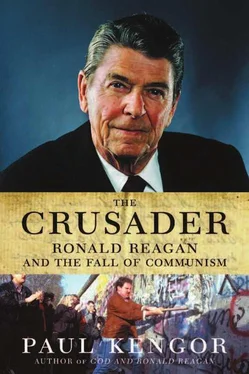Reagan rejected any “deal” between the United States and USSR that sold into “permanent slavery” those Eastern European captives behind the Iron Curtain. Such deals were not simply wrong and immoral, but the “greatest possible immorality.” Insisting that a nation which chose such a course was opting for “disgrace,” Reagan said that Alexander Hamilton warned that a nation that prefers disgrace to danger is prepared for a master and deserves one. America, he said, should choose the high road, not the low road. “Should Moses have told the children of Israel to live in slavery rather than dare the wilderness?” asked Reagan. “Should Christ have refused the Cross? Should the patriots at Concord Bridge have refused to fire the shot heard round the world?” 2
The future president concluded that Americans must choose “courage” over accommodation, telling his compatriots that all of America had a collective rendezvous with destiny. Together they could preserve for their children “this, the last best hope of man on earth,” or, rather, they could “sentence them to take the first step into a thousand years of darkness.” If they tried but failed, said Reagan dramatically, at least their children and children’s children could “say of us that we justified our brief moment here. We did all that could be done.” At the very least, this meant summoning the moral courage to reject accommodation with slave masters if and when such deals reared their cowardly heads. 3
STAYING FOCUSED ON THE CAMPAIGN
While his memoirs provided him with the opportunity to address larger, international issues like Soviet Communism, such grandiose, apocalyptic thinking must have made Reagan’s gubernatorial bid at times agonizing. The campaign forced him to set aside the global issues that stoked his passions in favor of the more immediate task of winning the governorship. With the help of a campaign team spearheaded by Phil Battaglia, Bill Clark, Tom Reed, and, among others, Lyn Nofziger, Reagan did his best to stay focused on California questions.
To that end, Nofziger, a California newspaper man who became candidate Reagan’s press secretary, was mystified over how Reagan “exuded confidence” during the campaign. He puzzled: Politically, Reagan was a novice who spent his entire life in radio or the movies. He knew little about governing. He had never been through the rough-and-tumble of a campaign. He never dealt with a political press, most of which was registered Democrat. Sure, Reagan ruminated often on the world’s daunting problems; those issues, however, were not part of the agenda of the California state assembly. And yet, said Nofziger, “none of this bothered Reagan.” “From the beginning he was serenely confident that he could handle himself.” During that 1966 campaign, “nobody had more confidence in Ronald Reagan than Ronald Reagan.” 4
Pat Brown certainly had little confidence in him. The Democratic governor proceeded to make the mistake of nearly every left-of-center individual who sized up Reagan over the next twenty-plus years: he dismissed and underestimated him.
In November 1966, Ronald Reagan was elected governor of California by the stunning margin of a million votes, carrying 400,000 Democrat defectors with him, and fifty-five of fifty-eight counties. Numerous Republican legislators were swept in on his coattails. Though that first term saw its ups and downs, his governorship still won encomiums from the state’s top (even liberal) editorial boards. The San Francisco Chronicle reported that in his first term Reagan had “saved the state from bankruptcy.” 5The Los Angeles Times judged Reagan an “accomplished practitioner in the art of government” and a “proven administrator.” The national media was also impressed: Newsweek dubbed him “one of the most brilliantly gifted politicians anywhere in the U.S. today—a campaigner unmatched for sheer star quality since the departure of Dwight Eisenhower and the arrival of the Kennedys a decade ago.” 6
THE GUBERNATORIAL YEARS—THE BATTLE RAGES ON
While far removed from his concerns for the Soviet bloc, it was clear from these first-term successes that Reagan’s strategy to use California as a stepping stone to a national office was working. And though he lacked the ability to shape national policy toward the Soviets, thirty years in radio, film, and television had taught him the power and utility of the spoken word. The realities of holding the highest state office in California made it such that Reagan’s “war” rhetoric needed to lessen, but it did not need to disappear. Since he was considered by many to be a potential presidential candidate, Reagan needed to speak out on national and international issues, including the Cold War. This also meant that he routinely was called upon to voice his opinions on the story that was dominating all of the headlines: the Vietnam War.
One episode that embodied such elements, and then vanished into the past, was a fascinating May 15, 1967 debate between Governor Reagan and Senator Robert F. Kennedy (D-NY). The subject: Vietnam. The debate was titled, “The Image of America and the Youth of the World,” and was billed by CBS as a “Town Meeting of the World.” It was broadcast from 10:00 to 11:00 pm (EDT) by CBS TV Network and CBS Radio Network. It was produced by later 60 Minutes brainchild Don Hewitt and hosted by CBS News correspondent Charles Collingwood. 7
The debate was watched by 15 million Americans and served as a wake-up call to those who underestimated Reagan. Revealing the governor to be exceptionally well-informed on the Vietnam issue, there was total agreement—even among media sources such as the San Francisco Chronicle and Newsweek who revered Bobby Kennedy—that Reagan overwhelmingly won the debate. “To those unfamiliar with Reagan’s big-league savvy,” reported Newsweek,“the ease with which he fielded questions about Vietnam may have come as a revelation.” Newsweek judged that “political rookie Reagan… left old campaigner Kennedy blinking when the session ended,” and thoughtfully speculated whether the debate might be a “dry run” for a future set of “Great Debates” between these two promising presidential aspirants. 8
Historian David Halberstam, a liberal, acknowledged that “the general consensus” was that “Reagan… destroyed him.” 9Lou Cannon agreed as well, saying that, “Reagan clearly bested Kennedy,” 10as did another of Reagan’s first biographers, Joseph Lewis. In his 1968 work on Reagan, Lewis recorded that the “tanned and relaxed” Reagan “talked easily and precisely without a hint of uncertainty or hostility,” and “deflated” the “anguished” Kennedy, who “gulped in restrained agony” when answering questions. Kennedy, said Lewis, “looked as if he had stumbled into a minefield”—which is a good metaphor, since the hostile questioners treated both him and Reagan like war criminals. 11
Truthfully, this was not a debate between Ronald Reagan and Bobby Kennedy. Rather, it descended into a venomous America-bashing session by a panel of extremely rude international students, who seemed to bask in their big chance to unleash their torrent of anger on the two available representatives of the country they despised. Newsweek rightly described the students as “interrogators.” In this atmosphere, Reagan and Kennedy ended up debating the group of students, not one another. And it was there that Reagan was so effective, whereas Kennedy was passive, meek, apologetic, and ineffective. Those looking for a defense of the United States not merely in Vietnam but as anything other than history’s greatest purveyor of global misery were frustrated by Kennedy’s lame responses but buoyed by Reagan’s strong retorts.
In one of the evening’s many disturbing moments, the students mockingly laughed out loud when Reagan said (obviously correctly) that the people of Mao’s China had never chosen their government. In a more gratifying exchange, a contemptuous British student, who Kennedy permitted to roll all over him, complained that the Diem regime, with the alleged help of U.S. advisers, had incarcerated six million Vietnamese in “forced prison camps.” With a smile, Reagan told the angry young man that there was no record whatsoever to confirm the allegation and that there were only sixteen million people in all of South Vietnam. Newsweek was impressed by this exchange, writing that Reagan “effortlessly reeled off more facts and quasifacts about the Vietnam conflict than anyone suspected he ever knew.” 12Especially notable, but forgotten by history, were Reagan’s remarks that evening concerning the Berlin Wall. The governor asserted:
Читать дальше












